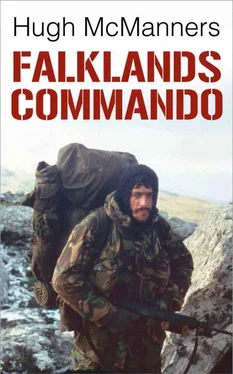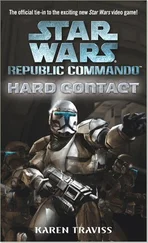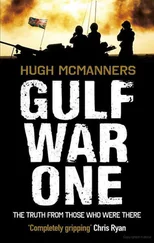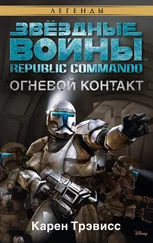Hugh McManners - Falklands Commando
Здесь есть возможность читать онлайн «Hugh McManners - Falklands Commando» весь текст электронной книги совершенно бесплатно (целиком полную версию без сокращений). В некоторых случаях можно слушать аудио, скачать через торрент в формате fb2 и присутствует краткое содержание. Город: London, Год выпуска: 2014, ISBN: 2014, Издательство: Nightstrike Publishing, Жанр: nonf_military, Биографии и Мемуары, на английском языке. Описание произведения, (предисловие) а так же отзывы посетителей доступны на портале библиотеки ЛибКат.
- Название:Falklands Commando
- Автор:
- Издательство:Nightstrike Publishing
- Жанр:
- Год:2014
- Город:London
- ISBN:978-0-992-81540-0
- Рейтинг книги:4 / 5. Голосов: 1
-
Избранное:Добавить в избранное
- Отзывы:
-
Ваша оценка:
- 80
- 1
- 2
- 3
- 4
- 5
Falklands Commando: краткое содержание, описание и аннотация
Предлагаем к чтению аннотацию, описание, краткое содержание или предисловие (зависит от того, что написал сам автор книги «Falklands Commando»). Если вы не нашли необходимую информацию о книге — напишите в комментариях, мы постараемся отыскать её.
Falklands Commando — читать онлайн бесплатно полную книгу (весь текст) целиком
Ниже представлен текст книги, разбитый по страницам. Система сохранения места последней прочитанной страницы, позволяет с удобством читать онлайн бесплатно книгу «Falklands Commando», без необходимости каждый раз заново искать на чём Вы остановились. Поставьте закладку, и сможете в любой момент перейти на страницу, на которой закончили чтение.
Интервал:
Закладка:
Commando training involves a lot of very cold, muddy water, climbing ropes, crawling through tunnels and marching for miles, soaking wet while carrying heavy kit. All the tests are preceded by long, gruelling exercises on Dartmoor, with inevitable bad weather; and candidates are messed around to such an extent that it no longer affects them. It’s very unpleasant but excellent preparation for war.
Those who succeed go on to Aldershot and the Depot of the Parachute Regiment for the notorious ‘P’ Company (Parachute Selection Company). This is a very severe physical test lasting for four weeks, involving carrying heavy weights on long runs and marches, with assault courses, log races and field exercises designed to test aggression, determination, fitness and sense of humour. P Company does not place the same emphasis on gruelling tactical training, but nevertheless many successful commandos find it overly extreme and ruthless. The parachute course itself, run in a gentlemanly fashion by the RAF, is sedate and relaxing by contrast with what has gone on before. The embryo ‘Nigsfo’ (as the Naval Gunfire Support Forward Observer is abbreviated) then starts his six-month communications, tactics and observation training. Not everyone who gets this far succeeds. Considerable mental aptitude is needed to pass.
The primary purpose of the Commando Forward Observation Unit is to control the fire of the guns of the Royal Navy from on land, and the unit is equipped and trained to be put ashore in every way imaginable so as to be able to do this job. In 1982, the unit was divided into a number of forward observation teams (FO teams), each of five men – the usual special forces patrol of four (so that if one is wounded, two carry him while the fourth scouts ahead), plus an additional member to liaise aboard the gunship or with a formation headquarters ashore, if required.
A Royal Artillery captain leads each FO team. He has a bombardier (the artillery equivalent of a corporal) as his assistant. The team may split to carry our more than one operation, so the bombardier will take charge of one of the two teams created. The other three men are a LRO (leading radio operator) or RO1 (radio operator class one) from the Royal Navy, a lance bombardier and a gunner.
Each team member is able to control the fire from a naval gunship and ordinary field artillery. The officer and bombardier are also trained to call in strike aircraft to bomb targets. The teams are normally well forward in battle, often behind enemy lines, getting ashore by boat, parachute or helicopter days before the main force. Thus they are part of the Special Forces network of eyes and ears that send information back to UK and the ships at sea.
Royal Marines Poole is very well equipped for the specialised training that is necessary to prepare for this demanding role. The dock area, known as the ‘Hard’, is the home of Landing Craft Company Royal Marines, who are experts in larger-scale assault craft work. The Special Boat Squadron, as they were known in 1982, also has their home in Poole, and 148 Battery has very close links with them, for the specific purpose of working together in war. This close relationship turned up trumps in the Falklands. At this time it was my responsibility to organise the teams allocated to working with the SBS and to lead one of those teams, FO1 (which is short for Forward Observation Team Number One).
Once you’ve managed to complete all the courses and get into 148 Battery, you still have to be accepted as a reliable member of the team, which can take some time. The combination of hardness, fitness, technical expertise and intelligence produces an out-of-the-ordinary sort of soldier who prefers to do things his own way.
Personal relationships within the FO teams are very close. They remain together for long periods and travel the world as a tightly-knit little unit. The officer is known as ‘the boss’ and the soldiers are referred to by their nicknames, in a relaxed, informal style that can be relied upon to irritate senior officers from outside the unit. On the rare occasion when the teams are in barracks, everyone makes great efforts to behave with due military deference. But when away, the teams will go out on the town together and become gratifyingly unmilitary. There is more contact with the Royal Navy and the Royal Air Force than the Army, which creates a ‘cosmopolitan’ attitude that does not always gain approval in the Army proper. As a consequence, unit members specialise in being as low-profile as possible, both on and off duty.
Naval gunfire support (NGS for short) fired from guns on ships, delivering a much heavier shell than the 105mm Light Gun with which the gunners in the Falklands were equipped – and was generally more accurate than artillery. The older ships such as HMS Antrim and HMS Plymouth fired a 55lb high explosive shell 18,000 yards at a rate of more than one every two seconds using twin barrels on a single turret. (A field artillery gun fires a 35lb shell at up to four or five per minute, depending on the fitness and skill of the crew.) This fire is very accurate and puts down about a ton of high explosive every minute. Some of these older ships have twin turrets, which doubles their firepower.
The next generation of ships (Type 21’s and Type 42’s) have digital computers and fully automatic loading systems and are even more accurate, with each single barrel firing a 46lb shell 24,000 yards at the rate of 24 shells every minute. The response time is very fast (the time from when the ship receives the coordinates of the target over the radio from us, to when the round lands); and with the one gun, two targets can be engaged at the same time with one of them being illuminated by star-shell (which is loaded automatically and fired to burst above the target). Targets can be stored in the computer to be fired upon immediately.
The accuracy of a rapid-firing single naval gun does not spread the shells around as with the widely-spaced guns of an artillery battery. Area targets like infantry defensive positions are therefore best attacked using field artillery. But for damaging and even destroying buildings and bridges, or wrecking well-prepared trench positions, especially with overhead cover and fortifications that would have withstood a field-artillery bombardment, a naval gun is much better.
NGS has various peculiarities that make it seem a bit of a black art to those familiar only with artillery. The shells sometimes don’t seem to do what they should, and there are seemingly inexplicable delays. All these things are in the nature of a system that’s operating from a ship at sea; and it’s only with experience and training that this very powerful weapon system can be made to unleash its full potential – which is the job of 148 Commando Forward Observation Battery.
As was usual for us, for January, February and most of March, 148 Battery had been in Norway with 3 Commando Brigade, doing mountain warfare training. This had finished with a week of parachuting, using special techniques involving sledges, onto frozen fjords, remote wooded hillsides and into the sea; and finally a large NATO exercise into which most of the unit parachuted in 5-man groups at night. This three-month period of ice and snow was an annual commitment, and many of the battery spent every winter there. One NCO had a total of sixteen Norway winters under his belt.
I’d been in the hospital for two weeks in January 1982 with back problems, and had gone out to Norway late to join the unit for the last part of the deployment – parachuting and the final exercise. I was not allowed to jump because of the back problems that had put me in hospital, so I’d been handling the administration – which was not really my style at all.
In April, thanks to our stint in Norway, we were already acclimatised and prepared for war in the cold. The Falkland Islands (if that was where we were to be sent) would be very wet – as opposed to the usually below-zero dry cold of Norway. This would make things more difficult. But thanks to our traditional training areas in the UK, we seemed to specialise in going to Dartmoor, Okehampton and Cape Wrath, all selected for rain, wind and cold. We’d already been through the Falklands-type misery many times before, and knew exactly how to cope.
Читать дальшеИнтервал:
Закладка:
Похожие книги на «Falklands Commando»
Представляем Вашему вниманию похожие книги на «Falklands Commando» списком для выбора. Мы отобрали схожую по названию и смыслу литературу в надежде предоставить читателям больше вариантов отыскать новые, интересные, ещё непрочитанные произведения.
Обсуждение, отзывы о книге «Falklands Commando» и просто собственные мнения читателей. Оставьте ваши комментарии, напишите, что Вы думаете о произведении, его смысле или главных героях. Укажите что конкретно понравилось, а что нет, и почему Вы так считаете.












